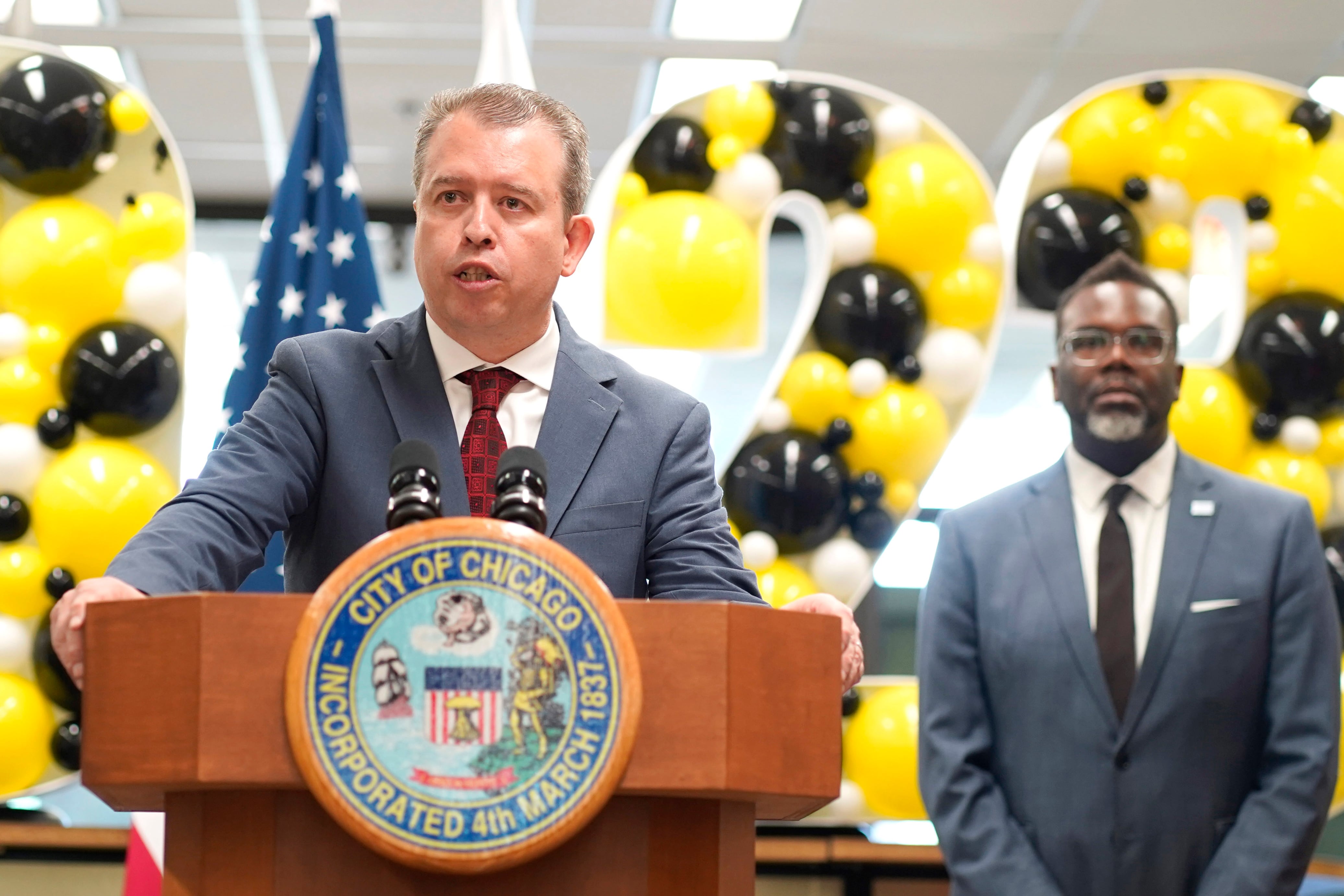Sign up for Chalkbeat Chicago’s free daily newsletter to keep up with the latest education news.
Amid turmoil over district leadership and a disagreement over the budget, Chicago Public Schools CEO Pedro Martinez said Wednesday that a special set of city funds meant to incentivize development could help stabilize the district’s finances.
In a prepared statement, Martinez said CPS has been advocating since April for the city to use Tax Increment Financing, or TIF, funds to help CPS pay for things like pension costs for non-teaching staff, costs related to a new Chicago Teachers Union contract, and the inaugural contract for a new principals union.
Martinez is at odds with Mayor Brandon Johnson over how to pay for the pension and union contract costs – expenses that the district did not set aside funds for in its current budget. The Johnson administration has pushed CPS for months to take out a short-term loan but district leaders have resisted, saying that it would saddle the district with high interest rates for years to come and could worsen CPS’s bond rating, making it harder to borrow in the future.
The disagreement factored into an extraordinary series of events in the past week — all seven members of the school board announced their plans to resign and Johnson swiftly named replacements, all as the city prepares for its historic first school board election. The new-look board will feature a mix of Johnson appointments and elected members in January.
The district’s proposal centers on TIF surplus funds, which haven’t been dedicated to a specific project and, according to the district, could help fund the $175 pension payment and labor agreement costs. Tax increment financing is a funding tool that uses future property tax revenue to fund community redevelopment projects.
This year’s budget, which covers the current school year, includes $159 million of TIF surplus funding – close to 40% of which is being used to cover the new contract with SEIU Local 73, which represents school support works, such as custodians. (CPS said the district has not yet received those funds.)
Martinez said “we all recognize that more revenue is necessary” to cover the pension and union contract costs.
According to CPS, more than $1.2 billion in property taxes are “diverted from CPS and other taxing bodies into TIF funds annually, depriving CPS of over $600 million in annual revenue.”
In his statement, Martinez said “government and labor partners are coalescing around this revenue source.” That, he said, means the district could pay for upcoming costs “without cuts, without taking on expensive short-term debt, and without waiting for additional funding to materialize from the State.”
In a statement, mayor’s office spokesperson Ronnie Reese said Johnson has repeatedly told Martinez that he would give CPS the maximum” TIF amount. He said Martinez “flatly refused” to adopt a budget that included union contract and pension costs “as covered by TIFs and additional financing.
“Had the CPS CEO worked collaboratively with the City and the Board of Education to pass a budget with the source of revenue being TIF and additional financing, as we and our [budget] team worked diligently to do, we would not be in the predicament we find ourselves in today,” Reese said.
Some local officials have floated the idea of providing more TIF funds to CPS, including Ald. Gilbert Villegas, WBEZ reported. That idea drew some nods, including from Chicago Teachers Union President Stacy Davis Gates and 40th Ward Ald. Andre Vasquez, who said it’s a “better recommendation” than a short-term loan.
The teachers union called this week to end all TIF districts and direct unused or unobligated money to Chicago Public Schools.
The mayor’s office has for months pushed CPS to take out a short-term loan that would help cover the union contracts and the $175 million pension payment – a cost the city used to cover until Mayor Lori Lightfoot took office. The mayor’s transition team report called for those funds to be returned to CPS, but in practice Johnson has so far asked CPS to cover that cost.
In a July 8 internal memo obtained by Chalkbeat, CPS described the idea from City Hall as a $300 million short-term loan that would incur high interest rates. CPS expressed concern that it would saddle the district with expensive debt down the road and worsen the district’s bond rating status, making it harder to borrow in the future for capital costs, such as repairing a school. A $300 million loan would cover 4% raises for members of the teachers and principals unions, the memo said.
“My team and I have specifically resisted taking out expensive short-term debt, and we have advocated against cuts, because we knew that this solution was on the table at our request,” Martinez said in Wednesday’s statement. “In fact, we developed scenarios to show how devastating each of these options would be if additional revenues were not found.”
Reema Amin is a reporter covering Chicago Public Schools. Contact Reema at ramin@chalkbeat.org .







